CONTENTS
Odd Contract Request
Fastest Game Ever
Don't Throw Your Glove at the Ball
Bug Invasions
Rapid Robert Returns
Dom vs Joe
Connie Mack – Thief?
Row on a Ball Field
Astrodome Oddities
Ducky Is Shot Down
Baseball Lore –
I
Baseball Lore – II
Baseball
Lore – III
Baseball
Lore – IV
Baseball
Lore – V
Baseball
Lore – VI
Baseball
Lore – VIII
Baseball
Lore – IX
Baseball
Magazine
Top of Page
|
Bits of Baseball Lore - VII
Before the 1903 season, C Ossee Schreckengost asked for an unusual clause to be inserted not in his own contract with the Philadelphia Athletics but in the contract of P Rube Waddell.
- Schreck had been one of Connie Mack's best acquisitions during the 1902 season in which the A's won the pennant in the second season of the American League. An outstanding C, Schreck had become friends with Wild Child Waddell when the two were batterymates at Louisville. Ossee not only helped Rube focus during games but also kept him in line off the field.
- Mack assigned Schreck to room with Rube on the road. In those days, it was standard practice in baseball for roommates to share not only a hotel room but also the bed. That experience led the C to ask Connie to insert a provision in Rube's contract prohibiting him from eating animal crackers in bed.
- Ossee explained: "This big bum has got to where he eats these little animal crackers every night. I didn't mind the flat crackers so much. But for a whole week last year, I woke up with elephants' tusks and cowhorns stickin' 'tween my ribs."
- Since Mack knew he couldn't get anyone else to room with Rube, he acceded to Schreck's request. Surprisingly, Rube did not protest and signed his contract.
However, Waddell gained some revenge on Mack a few days later.
- While with the team in Florida for spring training, Rube knocked on Mack's door late one night. Mack yelled that he was in bed but invited Rube in.
- Rube spoke to Connie about some inconsequential matter. While doing so, he ate a sandwich containing raw onions and limburger cheese. The mischievous southpaw made sure to drop crumbs and other morsels on Mack's bed while they spoke.
Reference: Rube Waddell, Alan H. Levy |
|
The Atlanta Crackers hosted the Mobile Sea Gulls on Saturday, September 17, 1910, at Ponce de Leon Park on the last day of the Southern League season.
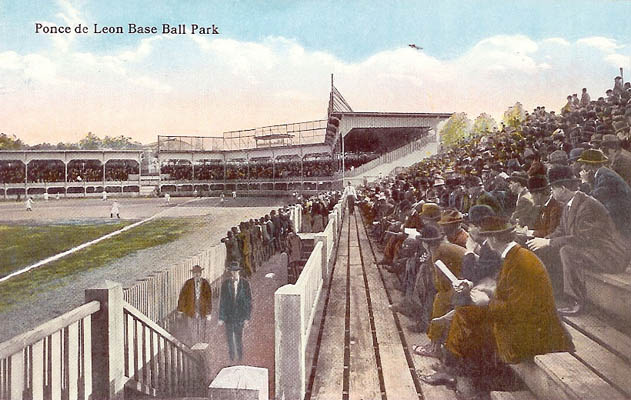
- Since the New Orleans Pelicans, led by Shoeless Joe Jackson, had clinched the pennant, the two teams contrived to play their nine-inning game in only 32 minutes.
- No explanation for the teams' haste survives. Possible reasons are: Desire to hit the road ASAP, a wager of some kind, or a deliberate attempt to break the record of 44 minutes set by another Atlanta team against Shreveport in 1904.
- The game caught the attention of the New York Times, which published this article the next day.
ATLANTA, Ga., Sept. 17. – Mobile and Atlanta broke the world's time record for a baseball game here this afternoon when they played a full nine-inning game in thirty-two minutes, Mobile winning 2 to 1.
This remarkable record was possible by the two teams going on the field and coming to bat on the run. Invariably the first ball delivered to each batter was struck at and usually hit, without any efforts to "place" it.
Thirty-five assists in the field tell the story. Nevertheless, there was some sensational stops and throws as well as some clever catches by the outfielders. Only one base on balls was recorded and only one strikeout. There were four stolen bases, one sacrifice hit, and one wild pitch, three two-baggers, one three-bagger, one triple, and one double play. It was a snappy game.
- The report was also picked up by many other newspapers including Portsmouth (NH) Herald, Mansfield (OH) News, Washington Post, Oakland (CA) Tribune, and Nevada State Journal (front page).
- Mobile turned a triple play in the second inning that helped speed matters along. With runners on first and third, the batter hit a fly that the RF caught and doubled the runner off first. The man on third tried to score, but the 1B relayed the ball to the plate to nail him.
- According to the Atlanta Journal, the two pitchers worked "like demented steam engines," each pitching a five-hitter.
- The Gulls scored the winning run in the top of the ninth. Of course, the game could have ended a few minutes earlier if the home team had won in 8 1/2 frames.
The Atlanta-Mobile game is 10 minutes faster than any other known professional game.
- On the same day, another Southern League contest between Nashville and New Orleans was completed in 42 minutes with the Vols winning 6-3. 29 hits were registered in that game.
- The major league record of 51 minutes was set by the New York Giants and Philadelphia Phillies on September 28, 1919, in the first game of a doubleheader at the Polo Grounds, the Giants winning 6-1.
- A Cincinnati-Brooklyn game a week earlier had flown by in 55 minutes to hold the record briefly.
Reference: "That Was Quick!," Wynn Montgomery, The National Pastime, SABR 2010
Top of Page |
|
Don't Throw Your Glove at the Ball
 |
On July 27, 1947, in the first game of a DH between the Red Sox and the St. Louis Browns at Fenway Park, Boston 1B Jake Jones hit a 60-foot triple that never reached fair territory. Here's what happened.
With two out and none on in the sixth inning, Jones hit a roller outside the 3B line. After the ball traveled 60 feet, P Fred Sanford threw his glove and struck the ball to keep it from going fair. Umpire Cal Hubbard awarded Jones a triple on the basis of Rule 7.05(c) which, as worded at that time, gave a runner "three bases if a fielder deliberately throws his glove at and touches a ball."
NL umpires followed an unwritten agreement to ignore the violation in the case of foul balls. However, AL umpires had no such understanding. In 1954, the rules committee finally amended the rule to apply only to fair balls.
|

Cal Hubbard
|
Reference: The Rules and Lore of Baseball, Rich Marazzi
Top of Page
|
|
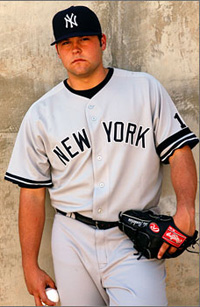
Joba Chamberlain

|
The most famous bug invasion of a baseball game occurred during Game 2 of the 2007 AL Division Series between the Yankees and Indians. The insects distracted New York P Joba Chamberlain in the bottom of the eighth to the point where he gave up the tying run on two walks and two wild pitches. Cleveland won 2-1 in the eleventh. Many commentators, not just Yankee fans, criticized the umpires for not suspending play to deal with the problem, as for a rain delay.
Here are some similar incidents from baseball history. None of them involved the Washington Gnationals. (Groan!)
- September 15, 1946: With twilight approaching in the sixth inning of the second game of a doubleheader between the Chicago Cubs and Brooklyn Dodgers at Ebbets Field, Dodger P Kirby Higbe was attacked by a swarm of gnats. Higbe threw up his hands and shouted to the umps that he couldn't pitch. As a result, the field was cleared. Since so many fans were waving their scorecards to fend off the bugs, the men in black called the game, giving the Dodgers a "bug-shortened" 2-0 victory during their tight pennant race with the St. Louis Cardinals (which ended in a playoff).
- June 2, 1959: The game between the Baltimore Orioles and Chicago White Sox at Comiskey Park was stopped when gnats attacked Orioles P Hoyt Wilhelm. The White Sox trainer ran out and swatted at the bugs with a towel to no avail. Then the grounds crew used bug spray. Finally, smoke bombs dispelled the pests, and the game resumed. Baltimore won 3-2.
- 1960: During a game against the Detroit Tigers, mosquitoes besieged Cleveland CF Jim Piersall. Calling time, he ran into the clubhouse and returned to CF with a spray gun that he used to disperse the insects, to the delight of the crowd.
- April 17, 1976: A bee invasion of the backstop screen caused the game at Riverfront Stadium between the Cincinnati Reds and the San Francisco Giants to be suspended for 35 minutes. Similar invasions took place in that stadium on May 26, 1980, and May 10, 1987. On one occasion, Reds P Ted Power was stung.
|
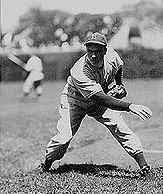
Kirby Higbe
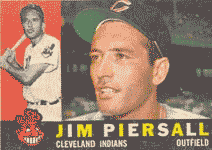
Top of Page
|
Reference: "Baseball Rules Corner," Rick Marazzi, Baseball Digest, January/February 2008
|
After nearly four years in the Navy, 26-year-old Bob Feller was discharged on August 22, 1945. The next day, he signed a contract for the rest of the season with his pre-war team, the Cleveland Indians, who still held exclusive rights to his services under the reserve clause.
Mired in fifth place after losing a doubleheader at home to the Washington Senators and needing a gate attraction, the Indians wasted no time in putting Rapid Robert back on the mound. He started Friday night, August 24, against the league-leading Detroit Tigers before a crowd of 46,477 at Municipal Stadium. Before the game, Indians great Tris Speaker presented Bob with a jeep to use on his farm. Feller then showed that he had lost nothing during his four years away from the major leagues. (He had played some baseball early in his service career.) He tossed a complete game four-hitter, striking out 12 and walking only four in a 4-2 victory over the team that would won the World Series that year.
Feller made eight more starts that season, finishing seven of them for a 5-3 record with 59 K in 72 innings. The biggest game attendance-wise was at Yankee Stadium on September 9 in the first game of a Sunday doubleheader that drew 72,152. Feller outpitched Yankees ace Spud Chandler in a 10-3 win, allowing only five hits.
|
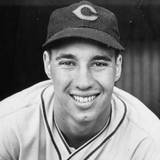
Bob Feller
Top of Page |
|
Former Commissioner Faye Vincent's book The Only Game in Town includes transcriptions of his interviews with former major leaguers. Dom DiMaggio, Boston Red Sox CF from 1940-53, relates several interesting stories related to his brother Joe's 56-game hitting streak in 1941.
- Dom, of course, followed the streak quite closely.
We were aware of Joe's streak. ... playing at Fenway Park, we had the scoreboard in LF, and Teddy [Williams] always talked to the scoreboard keeper and would get the news ... "Dommie, Dommie," he would call over to me, "Joe got a base hit in the second inning ..." and he'd keep me posted.
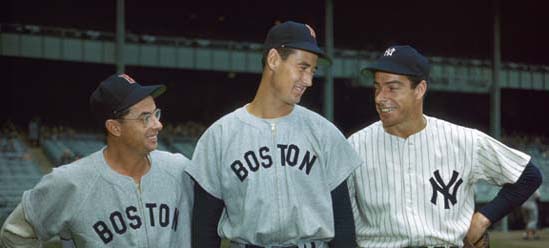
Dom DiMaggio, Ted Williams, and Joe DiMaggio
- Dom played against his older brother during the streak. One game in particular stands out in his mind.
Joe was out on the first trip [to the plate] and then a second trip. He hit a shot to left center field ... so many things ran through my mind, and the bases were loaded, I believe, at the time, and he was fighting for the runs batted in title. And I went out and I caught this ball in the tip of my web and as soon as I caught it, I got a sick feeling to my stomach. I said, "Oh, my God." You know, this is his third time at bat.
On the way in, after I caught the ball – and this was the third out of the inning – he was coming out to his place in CF and I've got to pass this guy and, gee, I'm feeling so sorry and then I turn to give him an apologetic look and ... he just turned at the same time and he looked at me – believe me, if looks could kill, I would have dropped right there, and I said, "Oh my God. I made an enemy."
The next at bat, he hit the ball into the seats so that nobody could catch it.
Top of Page
|
"Row on a Ball Field. A Lively Time in the Game Between Philadelphia and Boston"
That was the headline over the article in the July 18, 1894, New York Times concerning the National League game the previous day between the Philadelphia Phillies and the Boston Beaneaters. Here's what caused a riot.
- Boston led 2-1 going into the bottom of the eighth with rain in the offing.
- The Phillies scored seven runs, which caused the visitors to delay the game in every way they could think of, "positively refusing to make an effort at a put out."
- "Finally Delahanty went out for cutting second base" to end the inning.
- "The Bostons then refused to bat."
- Umpire Dan Campbell, a local substituted for the ill Billy Stage (only one arbiter assigned to a game in those days), gave the game to Philadelphia.
- The crowd, apparently sick of Boston's antics, "surged on the field" and began punching the visiting players. "Tucker, who had made himself particularly objectionable, was struck and had a bone in his cheek broken." Tucker is 1B Tommy Tucker who probably made no effort at fielding throws to put runners out at first.
- A squad of 25 policemen and some of the Phillies had to escort the Boston players from the grounds and for several blocks.
The rules of the day helped precipitate the riot. Under today's regulations, if the umpire had called the game because of rain in the bottom of the eighth after Philly took the lead, the entire eighth inning would have counted. However, in 1894, the game reverted to the previous inning if the home team did not complete the following inning. There were many other instances similar to the one just described where it was to the visitors' advantage to delay the end of the inning in hopes that the weather would cancel the rest of the game.
|

Ed Delahanty (Photo obviously
colorized much later)
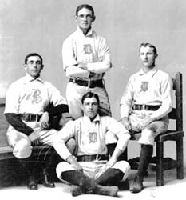
Boston Beaneaters Infield from
Turn
of 20th Century
Top of Page |
 Mike Schmidt Mike Schmidt

Houston Astrodome
|
In June 10, 1974, Mike Schmidt of the Philadelphia Phillies hit what is probably the longest single in MLB history.
The setting was the Houston Astrodome. Lefty Claude Osteen was the Astros' P when Schmidt clobbered a pitch so high that it struck a loudspeaker 329' from home and 117' above the playing field. The ball would undoubtedly have been a 500+ foot HR if it hadn't hit the speaker and dropped into CF. Instead, under the ground rules in effect, it was ruled a single.
Another Astrodome ground rule stated that, if a ball hit a speaker in foul territory and a fielder caught it, the batter was out.
You would think that, as an indoor stadium, the Astrodome never suffered a rainout. However, you would be wrong. On June 15, 1976, the scheduled game between the Astros and the Pittsburgh Pirates was cancelled when massive flooding in the Houston area prevented the umpires from reaching the stadium. Both teams had arrived early for practice but, with no umps, the game was called off. Tables were brought onto the field. and both teams shared their clubhouse meal with the few fans who braved the flood.
Top of Page |
Joe Medwick was an All-Star for the St. Louis Cardinals from 1933 through 1939, playing at least 146 games each season. He won the Triple Crown and NL MVP in 1937 (the last an NL player won the Triple Crown). Ducky (as Medwick was called because someone thought he waddled rather than walked) got a reputation as a combative, selfish player. He once knocked out teammate Tex Carleton because he walked in front of the camera during a photo session. And several other Cardinals got knuckle sandwiches from him for various infractions. So on June 12, 1940, Cardinals' GM Branch Rickey traded Medwick and P Curt Davis to the Brooklyn Dodgers for Ernie Koy, Carl Doyle, Sam Nahem, Bert Haas, and $125,000.
Facing his former teammates just six days later, Medwick was beaned in the head by Cardinals' pitcher Bob Bowman. The umpires stopped several Dodgers from charging the mound. In the home team dugout, Dodgers GM Larry MacPhail was restrained from going onto the field by coach Chuck Dressen and player Babe Phelps. After Medwick regained consciousness and was removed from the field on a stretcher, Cardinal manager Billy Southworth, in only his sixth game since taking over from Mike Gonzalez, removed Bowman from the game to avoid repercussions from the fans. Two detectives appeared on the Cardinal bench. MacPhail crossed the field and exchanged heated words with the visitors. A later account says that Bowman had to be escorted from Ebbets Field to his hotel by police. Other reports say that, as Bowman was led through the Dodger dugout to the locker room, MacPhail, from his box seat, swung and knocked Bowman's cap off. However, the New York Times story the day after the game does not mention these latter incidents.
The Times account also says that "prior to yesterday's game Bowman and Leo Durocher, the Brooklyn pilot, exchanged words, by way of widening the breach." The writer (Louis Effrat) was referring to "a certain amount of ill feeling between the Dodgers and Cardinals for a year now." He added, "Last season Bowman and Hugh Casey opposed each other in a game at St. Louis in which both pitchers were accused of throwing dusters." It is also stated on some Internet sites that, on the morning of the beaning, Medwick, Durocher, and Bowman had supposedly exchanged words in the elevator of the New Yorker Hotel. According to Durocher, Bowman shouted, "I'll take care of both of you guys! Wait and see!"
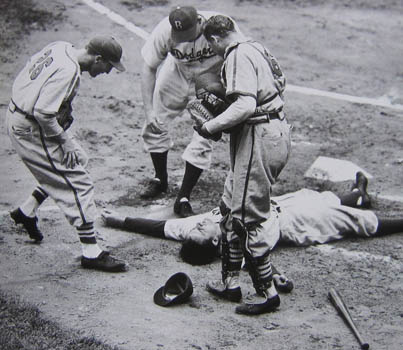
Bob Bowman (26) stands over Joe Medwick after beaning.
Medwick spent several days in the hospital with a concussion. At first expected to be out three weeks, he pinch hit on June 21, only two days after the beaning. MacPhail called – unsuccessfully – for Bowman to be punished by NL Commissioner Ford Frick and also asked the Brooklyn DA to investigate the incident. However, on the same day Joe left the hospital, the DA announced that his office had uncovered no "evidence of any criminal intent on the part of Bowman." Medwick himself said that he knew of no threats of bodily injury. Frick did not suspend or fine Bowman.
Medwick hit .300 the rest of the season for the Dodgers, then in 1941 hit .318 to help Brooklyn to their first pennant in 21 years. Rickey, who replaced MacPhail as Dodgers GM in 1943, traded Medwick again that year, this time to the New York Giants. Joe returned to the Cardinals in 1947 and retired in 1948 after an injury-plagued season.
Ducky never produced the numbers after the beaning that he did before it. But that is easily explained by the fact that (a) he was past his peak in age and (b) the success he had the first part of his career was Hall of Fame level – difficult for anyone to duplicate at any age.
|

Joe Medwick

Larry MacPhail and Branch Rickey
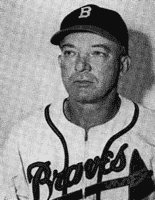
Billy Southworth
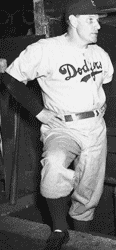
Leo Durocher
Top of Page |
|